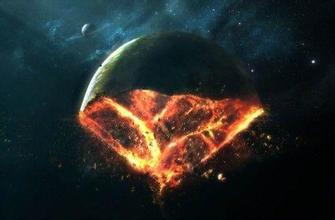(单词翻译:单击)
"Excited, I took the book home that night and opened it before dinner,
那天晚上,我很兴奋,把这本书抱回了家,晚饭之前就把书打开--我想,
an action that I expect prompted my mother to feel my forehead and ask if I was all right-and, starting with the first page, I read.
正是由于这个举动,我的母亲摸了摸我的额头,看看我是不是病了--翻到第一页,读了起来。
And here's the thing. It wasn't exciting at all. It wasn't actually altogether comprehensible.
结果发现,这本书毫不激动人心。实际上,它不是包罗万象的。
Above all, it didn't answer any of the questions that the illustration stirred up in a normal inquiring mind:
首先,它没有回答插图在正常人好奇的脑子里产生的任何问题:
How did we end up with a Sun in the middle of our planet?
我们行星的中央怎么会冒出来一个太阳,他们怎么知道它的温度?
And if it is burning away down there, why isn't the ground under our feet hot to the touch?
要是它在下面熊熊燃烧,我们脚下的地面怎么摸上去不是烫的?
And why isn't the rest of the interior melting-or is it?
为什么内部的其余部分不在熔化,或者正在熔化?

And when the core at last burns itself out, will some of the Earth slump into the void, leaving a giant sinkhole on the surface?
要是地心最终烧尽以后,地球的某个部分是不是会塌进那个空间,在地面上留下一个大坑?
And how do you know this? How did you figure it out?
而你是怎么知道这个的?你是怎么测算出来的?
But the author was strangely silent on such details-indeed, silent on everything but anticlines, synclines, axial faults, and the like.
教科书的作者似乎有个普遍的阴谋,他们要极力确保他们写的材料绝不过于接近稍有意思的东西,起码总是远远回避明显有意思的东西。
It was as if he wanted to keep the good stuff secret by making all of it soberly unfathomable.
他似乎有意把一切都弄得深不可测,以便守住好东西的秘密。
As the years passed, I began to suspect that this was not altogether a private impulse.",
随着岁月流逝,我开始认为这不完全是个个人动机。
There seemed to be a mystifying universal conspiracy among textbook authors
但是,说来也怪,作者
to make certain the material they dealt with never strayed too near the realm of the mildly interesting
对这些具体疑问只字不提--实际上对任何疑问都只字不提,
and was always at least a longdistance phone call from the frankly interesting."
只是说些什么背斜呀,向斜呀,地轴偏差呀,等等。


